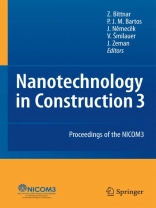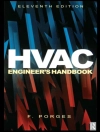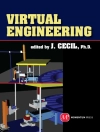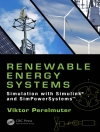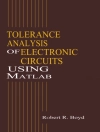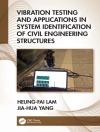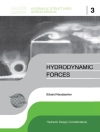The 3rd International Symposium on Nanotechnology in Construction (NICOM 3) follows the highly successful NICOM 1 (Paisley, UK 2003) and NICOM 2 (Bilbao, Spain 2005) Symposia. The NICOM3 symposium was held in Prague, Czech Republic from May 31 to June 2, 2009 under the auspices of the Czech Technical University in Prague. It was a cross-disciplinary event, bringing together R&D experts and users from different fields all with interest in nanotechnology and construction. The conference was aimed at:
- Understanding of internal structures of existing construction materials at nano-scale
- Modification at nano-scale of existing construction materials.
- Production and properties of nanoparticulate materials, nanotubes and novel polymers.
- Modeling and simulation of nanostructures.
- Instrumentation, techniques and metrology at nano-scale.
- Health and safety issues and environmental impacts related to nanotechnology during research, manufacture and product use. Review of current legislation.
- Societal and commercial impacts of nanotechnology in construction, their predictions and analysis.
Inhoudsopgave
Plenary Papers.- Potential Environmental and Human Health Impacts of Nanomaterials Used in the Construction Industry.- Nanotechnology in Construction: A Roadmap for Development.- The Colloid/Nanogranular Nature of Cement Paste and Properties.- Nanotechnology and Cementitious Materials.- Probing Nano-structure of C-S-H by Micro-mechanics Based Indentation Techniques.- Keynote Papers.- Innovative Building Material – Reduction of Air Pollution through Tio Cem®.- Nanomechanical Explorations of Cementitious Materials: Recent Results and Future Perspectives.- Developments in Metrology in Support of Nanotechnology.- Concrete Nanoscience and Nanotechnology: Definitions and Applications.- Continuum Microviscoelasticity Model for Cementitious Materials: Upscaling Technique and First Experimental Validation.- Production, Properties and End-Uses of Nanofibres.- The Fractal Ratio as a Metric of Nanostructure Development in Hydrating Cement Paste.- A Review of the Analysis of Cement Hydration Kinetics via 1H Nuclear Magnetic Resonance.- Analysing and Manipulating the Nanostructure of Geopolymers.- Nanotechnology Applications for Sustainable Cement-Based Products.- Nanoscale Modification of Cementitious Materials.- Progress in Nanoscale Studies of Hydrogen Reactions in Construction Materials.- Engineering of Si O2 Nanoparticles for Optimal Performance in Nano Cement-Based Materials.- Regular Papers.- Improving the Performance of Heat Insulation Polyurethane Foams by Silica Nanoparticles.- Eco-innovation Strategies in the Construction Sector: Impacts on Nanotech Innovation in the Window Chain.- Interpretation of Mechanical and Thermal Properties of Heavy Duty Epoxy Based Floor Coating Doped by Nanosilica.- Nanoindentation Study of Na-Geopolymers Exposed to High Temperatures.-Nanoscale Agent Based Modelling for Nanostructure Development of Cement.- CHH Cement Composite.- Modeling of Nanoindentation by a Visco-elastic Porous Model with Application to Cement Paste.- Multi-scale Study of Calcium Leaching in Cement Pastes with Silica Nanoparticles.- Nanotechnologies for Climate Friendly Construction – Key Issues and Challenges.- The Potential Benefits of Nanotechnology for Innovative Solutions in the Construction Sector.- Use of Nano-Si O2 to Improve Microstructure and Compressive Strength of Recycled Aggregate Concretes.- The Effect of Various Process Conditions on the Photocatalytic Degradation of NO.- Molecular Dynamics Approach for the Effect of Metal Coating on Single-Walled Carbon Nanotube.- Polymer Nanocomposites for Infrastructure Rehabilitation.- Nanotechnology Divides: Development Indicators and Thai Construction Industry.- Improvement of Cementitious Binders by Multi-Walled Carbon Nanotubes.- Effect of Nano-sized Titanium Dioxide on Early Age Hydration of Portland Cement.- Nano-modification of Building Materials for Sustainable Construction.- Study of P-h Curves on Nanomechanical Properties of Steel Fiber Reinforced Mortar.- Evolution of Phases and Micro Structure in Hydrothermally Cured Ultra-High Performance Concrete (UHPC).- Interparticle Forces and Rheology of Cement Based Suspensions.- Nanocomposite Sensing Skins for Distributed Structural Sensing.- Utilization of Photoactive Kaolinite/Ti O2 Composite in Cement-Based Building Materials.- Nanomechanical Properties of Interfacial Transition Zone in Concrete.- Mitigation of Leachates in Blast Furnace Slag Aggregates by Application of Nanoporous Thin Films.- Possible Impacts of Nanoparticles on Children of Thai Construction Industry.- Characterization of Alkali-Activated Fly-Ash by Nanoindentation.- Multi-scale Performance and Durability of Carbon Nanofiber/Cement Composites.- Nano-structured Materials in New and Existing Buildings: To Improved Performance and Saving of Energy.- Stability of Compressed Carbon Nanotubes Using Shell Models.- Bending Instabilities of Carbon Nanotubes.- Effect of Surface Roughness on the Steel Fibre Bonding in Ultra High Performance Concrete (UHPC).- Geotechnical Properties of Soil-Ball Milled Soil Mixtures.- Mortar and Concrete Reinforced with Nanomaterials.- Experimental Study and Modeling of the Photocatalytic Oxidation of No in Indoor Conditions.- Spray Deposition of Au/Ti O2 Composite Thin Films Using Preformed Nanoparticles.- Nanoindentation Study of Resin Impregnated Sandstone and Early-Age Cement Paste Specimens.- Posters.- Heterogeneous Photocatalysis Applied to Concrete Pavement for Air Remediation.- Synthesis of ?-Al2O3 Nanopowder by Microwave Heating of Boehmite Gel.- Effects of Sabalan Tuff as a Natural Pozzolan on Properties of Plastic Concrete.- Synergistic Action of a Ternary System of Portland Cement – Limestone – Silica Fume in Concrete.
